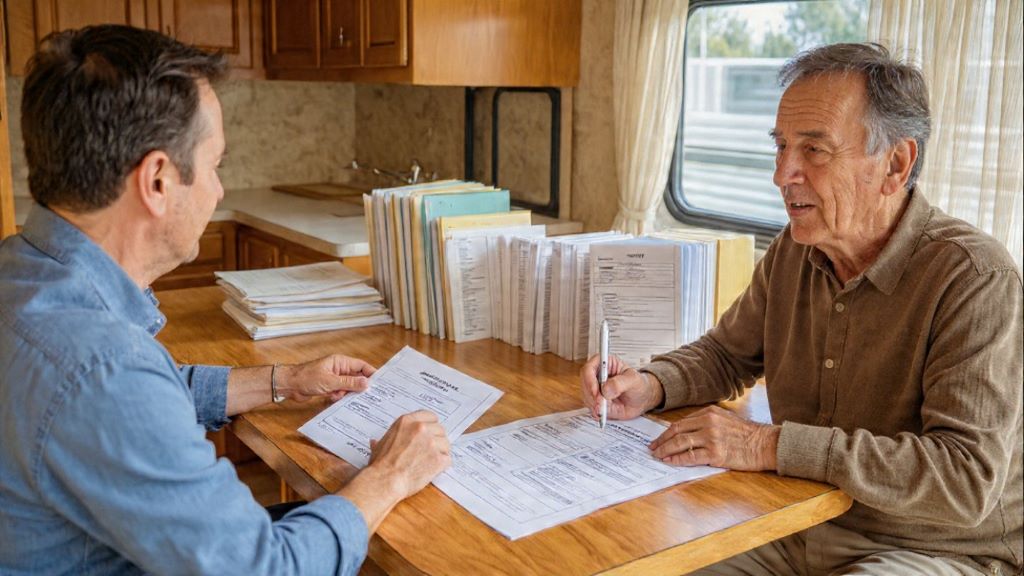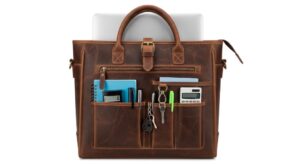What RV Records to Give New Buyer

Selling a motorhome involves more than just handing over the keys. When you transfer ownership, providing the right documentation helps build trust and protects both parties. Many sellers wonder what paperwork they should gather before listing their vehicle. The answer depends on your motorhome’s history and condition. However, having complete records ready makes the transaction smoother and faster. At Local Motor Homes, we understand that proper documentation can make or break a sale.
Essential Documentation Every Buyer Expects
Most buyers want to see proof that your motorhome has been well maintained. Therefore, gathering service records should be your first priority. These documents show oil changes, tire rotations, and major repairs. Additionally, warranty information matters if your vehicle still has coverage. Keep copies of registration and title documents easily accessible. Furthermore, having these papers organized demonstrates you’ve been a responsible owner.
When preparing your motorhome for sale, understanding what to watch out for when selling a motor home helps you avoid common pitfalls. Many sellers forget important details that buyers notice immediately. Consequently, taking time to review your documentation now saves headaches later.
Maintenance Records That Build Confidence
Service history tells a story about how you treated your motorhome. Buyers feel more comfortable when they see regular maintenance. Start by collecting receipts from oil changes and filter replacements. Then, add records of brake inspections and transmission services. These papers prove you followed manufacturer recommendations.
Moreover, documentation of major repairs adds value to your sale. If you replaced the engine or transmission, those receipts matter significantly. Similarly, records of appliance repairs show buyers what works properly. Keep invoices from RV service centers and independent mechanics together. This organization makes it easy to answer buyer questions quickly.
Appliance and System Documentation
Your motorhome contains many complex systems that require special attention. Manuals for appliances help new owners operate everything correctly. Include instruction booklets for the refrigerator, furnace, and air conditioner. Additionally, provide information about the water heater and generator. These guides help buyers troubleshoot minor issues without expensive service calls.
Many modern motorhomes have sophisticated electrical systems and slide-out mechanisms. Therefore, documentation for these components becomes crucial. Keep warranty cards and installation certificates for upgraded equipment. Furthermore, if you added solar panels or inverters, provide those manuals too. Buyers appreciate having everything they need from day one.
Title and Registration Requirements
The title represents legal ownership of your motorhome. You must have a clear title without liens before selling. Check your state’s requirements for title transfer procedures. Some states require notarization while others have simpler processes. Additionally, verify that all names on the title match current ownership exactly.
Registration documents show your motorhome complies with local regulations. However, buyers will need to register in their own state. Provide a copy of your current registration anyway. This helps buyers verify the vehicle identification number matches all paperwork. According to the National Highway Traffic Safety Administration, accurate VIN documentation prevents fraud and protects both parties.

Inspection Reports and Certifications
Professional inspection reports give buyers peace of mind about their purchase. If you had recent inspections done, share those results. These reports cover everything from structural integrity to plumbing systems. Moreover, they identify potential problems before they become deal-breakers. Buyers often feel more confident when independent experts have reviewed the motorhome.
Some states require emissions testing or safety inspections for RVs. Keep certificates from these mandatory checks with your other documents. Additionally, if you had specialized inspections for roof condition or frame integrity, include those reports. Transparency about your motorhome’s condition helps negotiations proceed smoothly.
Warranty Information and Transferability
Extended warranties can transfer to new owners in many cases. Check your warranty documents for transfer procedures and fees. Some manufacturers allow one free transfer while others charge administrative costs. Therefore, contact the warranty provider before listing your motorhome. Get written confirmation about transfer options and requirements.
Original manufacturer warranties may still have time remaining. These warranties add significant value to your sale price. Provide buyers with warranty booklets and proof of coverage. Furthermore, explain what components remain under warranty protection. This information helps buyers understand the true value of their investment.
Modification and Upgrade Records
Custom modifications affect your motorhome’s value and functionality. Document all upgrades you made during ownership. This includes new tires, upgraded batteries, or improved suspension components. Additionally, keep receipts for cosmetic improvements like new upholstery or flooring. These investments deserve recognition in your asking price.
Some modifications require professional installation or permits. Solar panel installations might need electrical permits in some areas. Similarly, structural changes could require inspection certificates. Gather all relevant documentation for modifications you completed. Buyers want assurance that upgrades meet safety standards and building codes.
Insurance Claims and Accident History
Honesty about accidents protects you from future liability issues. Disclose any insurance claims filed during your ownership. Provide documentation showing repairs were completed properly. However, minor claims for windshield replacement or small dents usually don’t concern buyers much. Major accident repairs require more detailed explanation and documentation.
Many buyers run vehicle history reports before purchasing. These reports reveal accidents and title problems automatically. Therefore, being upfront about issues builds trust immediately. Share your own vehicle history report if you have one. This transparency demonstrates you have nothing to hide about the motorhome’s past.
Operating Manuals and Quick Reference Guides
Owner’s manuals help new buyers understand their motorhome’s features completely. These books explain everything from dashboard controls to storage compartments. Include manuals for the chassis manufacturer and RV builder separately. Additionally, gather quick reference cards for emergency procedures. New owners appreciate having clear instructions for common tasks.
Many manufacturers now provide digital versions of manuals online. However, physical copies remain valuable for reference while traveling. If you lost original manuals, download and print replacement copies. Furthermore, create a simple guide highlighting your motorhome’s quirks. Every RV has unique characteristics that new owners should know about.
Fuel Economy and Mileage Logs
Detailed mileage records help buyers estimate operating costs accurately. Keep logs showing fuel consumption on different types of trips. Note whether you were towing vehicles or traveling through mountains. These details help buyers budget for their own adventures. Additionally, fuel economy information proves your motorhome runs efficiently.
Some buyers want to know average maintenance costs per mile. Calculate these figures using your service records and mileage logs. This information sets realistic expectations about ownership expenses. Moreover, it demonstrates you tracked your motorhome’s performance carefully. Responsible owners keep detailed records that benefit everyone involved.
Storage and Winterization Documentation
Proper storage protects motorhomes from weather damage and deterioration. Document how you stored your vehicle during off-season months. Include information about winterization procedures you followed. Additionally, provide receipts for storage facilities if you used them. This proves your motorhome stayed protected from harsh conditions.
Winterization procedures vary by climate and motorhome type. Explain which antifreeze you used in water systems. Note whether you removed batteries for indoor storage. Furthermore, describe any covers or protective measures you employed. Buyers in cold climates especially appreciate thorough winterization documentation.
Creating an Organized Document Package
Present all documents in a logical, easy-to-navigate format. Use a binder with labeled sections for different document types. Start with title and registration at the front. Then organize maintenance records chronologically. Additionally, create a table of contents for quick reference.
Digital copies provide convenient backup for important papers. Scan all documents and save them in clearly named files. Offer to share these files with serious buyers via email. However, never send sensitive information until you verify buyer identity. According to Consumer Reports, protecting personal information during sales prevents identity theft.
Conclusion
Providing complete records when selling your motorhome benefits everyone involved in the transaction. Buyers gain confidence knowing the vehicle’s complete history and maintenance schedule. Meanwhile, sellers demonstrate responsible ownership and build trust quickly. Therefore, gathering these documents before listing your motorhome saves time and smooths negotiations. Remember to include service records, warranties, manuals, and all relevant certifications. Additionally, organize everything professionally to make a strong first impression. Taking these steps helps you achieve a faster sale at your desired price.
Frequently Asked Questions
What happens if I lost some maintenance records for my motorhome?
Contact service centers where you had work completed and request duplicate receipts. Many shops keep digital records going back several years. Additionally, check credit card statements to identify service dates and providers. While complete records are ideal, don’t worry if minor receipts are missing.
Do I need to provide records for routine oil changes?
Yes, oil change records demonstrate consistent maintenance habits. These simple documents prove you followed manufacturer recommendations. Moreover, they show buyers the motorhome received proper care throughout your ownership. Even basic maintenance records add value to your sale.
Should I include records from the previous owner?
Absolutely include any documentation you received when purchasing the motorhome. Previous maintenance history adds to the vehicle’s complete story. Additionally, older records might contain warranty information that still applies. More documentation always benefits the sale process.
Can buyers use my warranty after purchasing the motorhome?
Many extended warranties transfer to new owners for a small fee. Contact your warranty provider to confirm transfer policies and procedures. Some manufacturer warranties transfer automatically with ownership. Therefore, check specific terms before advertising warranty coverage in your listing.
What documents do I need at the actual sale closing?
Bring the title, current registration, bill of sale, and odometer disclosure statement. Additionally, have your driver’s license for identity verification. Some states require notarized signatures for title transfers. Therefore, check local requirements before meeting with the buyer to finalize the sale.
Related Topics:
Why Does My Car’s Fuel Efficiency Decrease in Humid Weather?








